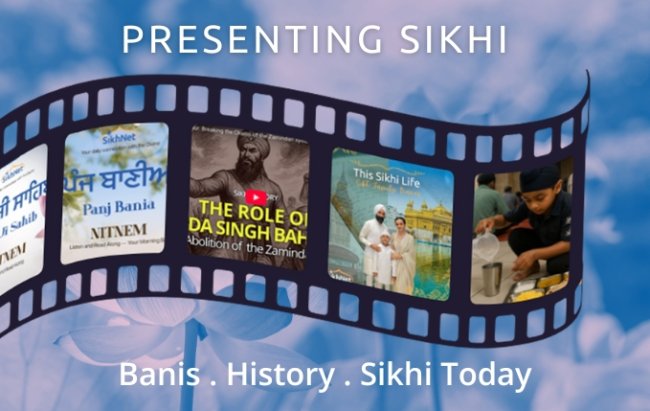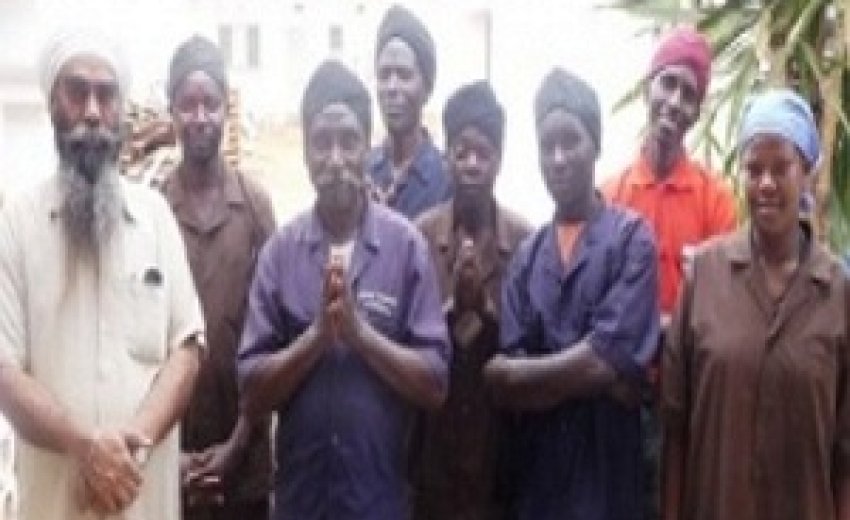San Antonio, TX., 11 to 14 Sep. 2010: Sikh Research Institute (SikhRI) presented a series of events for a tour, “Conversations with Sikh-Kenyans”. The schedule included four events in Nairobi, one in Kisumu, and a radio interview on Sound Asia FM, as well as numerous meetings with members of the community and their organizations. The events were well attended by local kalasingas—the Kiswahili word for Sikh-Kenyans—and some who made a special trip back to the country, from their current homes outside of Kenya.
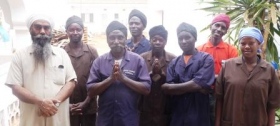 Harinder Singh, chief programming officer for SikhRI, was overwhelmed by the positive response from attendees and was encouraged by the enthusiastic feedback he received at each event. In touring Kenya, Harinder visited Makindu gurdwara, a site with a 100 year history on the Mombasa-Nairobi highway, which serves at least 300 travelers a day— their open kitchen feeding 2,000 on weekends. Locals use the facility as a free hospital and marketplace, and all this is done without a single Sikh resident of town, the gurdwara is run by outside hires. Harinder was able to meet with Makindu gurdwara management to discuss holding future Sikh events and training in the community facilities.
Harinder Singh, chief programming officer for SikhRI, was overwhelmed by the positive response from attendees and was encouraged by the enthusiastic feedback he received at each event. In touring Kenya, Harinder visited Makindu gurdwara, a site with a 100 year history on the Mombasa-Nairobi highway, which serves at least 300 travelers a day— their open kitchen feeding 2,000 on weekends. Locals use the facility as a free hospital and marketplace, and all this is done without a single Sikh resident of town, the gurdwara is run by outside hires. Harinder was able to meet with Makindu gurdwara management to discuss holding future Sikh events and training in the community facilities.
The drive to take up the responsibilities of organizing within the Kenyan-Sikh community seemed to hum through the air at many of SikhRI’s events. Ashminder Kaur, coordinator for the tour, commented on the atmosphere: "It was exciting and motivating for Sikhs in Kenya to interact with Harinder Singh; meetings with all ages and the leadership resulted in a new direction and focus for the community and better clarity on Sikhi topics discussed,” she said. “The events were different and new and there is significant demand for a follow up visit to capitalise on the foundation laid, and to build on projects in the Sikh interest."
The first “Conversations with Sikh-Kenyans” event, organized by the Sikh Women’s Society, took place on 11 September at the Siri Guru Singh Sabha Gurdwara in Nairobi and was attended by 300 people. The presentation, “Women: Gateway to Freedom”, explored the scriptural, historical, and cultural place of women in Sikh society and “the Sikh Solution” to equitable, modern gender relations which respect these traditions. The frankness of the discussion seemed to make an impression on many in the audience, who voiced their appreciation in the comments afterward. “A very inspiring talk, thank you for talking about the importance of women in a room full of men … and making us realize how practical Sikhism is,” said Chhindi Kaur Sagoo of Nairobi.
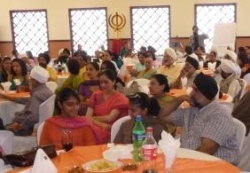 The next day, 12 September, 200 people attended a talk on the topic “What is Gurmat?” The lecture addressed current confusion over what can be called Gurmat and how some interpretations of the Guru’s wisdom are individual opinion in disguise. Later, 50 participants came together at the gurdwara for an engaging community dialogue centered around the theme, “What Are the Youngster’s Thinking?” Questions explored during the dialogue included: What are the challenges today for Sikhs and how can they be addressed from a Sikh perspective? Why does the current generation need to integrate Sikh and Kenyan values? Many Sikhs present at the discussion said they left feeling reinvigorated to take on the challenges they faced together. “ Sikhism has finally been made simple and straightforward and I look forward to practicing Sikh values more after this extremely beneficial workshop,” said Roop Kaur of Nairobi.
The next day, 12 September, 200 people attended a talk on the topic “What is Gurmat?” The lecture addressed current confusion over what can be called Gurmat and how some interpretations of the Guru’s wisdom are individual opinion in disguise. Later, 50 participants came together at the gurdwara for an engaging community dialogue centered around the theme, “What Are the Youngster’s Thinking?” Questions explored during the dialogue included: What are the challenges today for Sikhs and how can they be addressed from a Sikh perspective? Why does the current generation need to integrate Sikh and Kenyan values? Many Sikhs present at the discussion said they left feeling reinvigorated to take on the challenges they faced together. “ Sikhism has finally been made simple and straightforward and I look forward to practicing Sikh values more after this extremely beneficial workshop,” said Roop Kaur of Nairobi.
That afternoon, Mr. Amarjeet Singh Bahra interviewed Harinder Singh on Sound Asia FM, in the studio in Nairobi, where the two discussed the goal of SikhRI’s Kenyan tour: To educate attendees in sharing the knowledge of Sikhi among themselves and the next generation. The following evening, on 13 September, Harinder traveled to the town of Kisumu, visited with fourth-generation Sikh farmers, and met with community leaders. One hundred fifty residents and visitors met there for a talk on “Rekindling the Sikh Spirit.” The presentation entreated attendees to reinvigorate their communities through developing Guru-initiated processes, and strengthening institutions for the collective good.
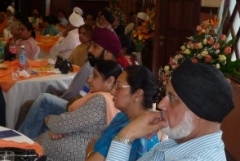 Before preparing to depart the country, on 14 September, 30 members of the community met for a discussion at A nghiti Restaurant in Nairobi. The session’s goal was to outline a series of benchmarks for Sikh-Kenyans to work toward achieving by 2020. The heart of the discussion built on the historically renowned achievements of Sikhs in Kenya, and the impact of the population decline as younger Sikh-Kenyans leave the country to settle elsewhere. The main question which the 10-year plan centered around was essentially: What tools and programs does the current leadership need to invest in, in order to revive the great Sikh-Kenyan heritage?
Before preparing to depart the country, on 14 September, 30 members of the community met for a discussion at A nghiti Restaurant in Nairobi. The session’s goal was to outline a series of benchmarks for Sikh-Kenyans to work toward achieving by 2020. The heart of the discussion built on the historically renowned achievements of Sikhs in Kenya, and the impact of the population decline as younger Sikh-Kenyans leave the country to settle elsewhere. The main question which the 10-year plan centered around was essentially: What tools and programs does the current leadership need to invest in, in order to revive the great Sikh-Kenyan heritage?
Later in the evening, there was a second meeting with the iSikh group to explore the possibilities of holding Sikhi camps in the area which would emphasize the systematic teaching of the Panjabi language and the foundations of Sikhi culture. Joginder Dhadialla, chairman of the Siri Guru Singh Sabha Gurdwara, summed up his organization’s pleasure in sponsoring the tour: “Our audience enjoyed the consistently outstanding presentations,” he said. “In my opinion, the attendance was amongst the largest ever witnessed for a forum of this nature. His in-depth knowledge of Gurbani and Sikhi, coupled with his clarity of his vision for the Sikh youth enabled us to realise issues more clearly and view them from new perspectives.” SikhRI is deeply grateful to our organizers, sponsors and hosts in Nairobi and Kisumu, and especially to all who attended the events and shared so openly their hopes for a stronger, more vital Sikh-Kenyan community in the near future.
Contact:
Shraddha Nembang [email protected] | 210-757-4555
